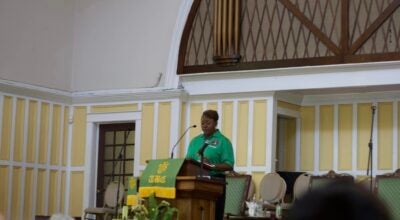Bishop to be laid to rest
Published 11:14 pm Friday, January 11, 2013
Hundreds attended the funeral for the Auxiliary Bishop in Detroit; a Selma native who grew up during years that Selma became famous for — the years of segregation in the South.
Moses Anderson, 84, passed away from a heart attack on New Year’s Eve but the man who oversaw duties in the Archdiocese of Detroit taught others about segregation and caring for the poor through Christ while he walked the Earth.
The Detroit Free Press reported that Anderson’s funeral brought friends to recall how he overcame segregation, poverty and anti-Catholic prejudice while he grew up in Selma. Only three of his classmates out of a class of 2,000 were Catholic. At this same time he was treated as “colored” — so within the region there were two minority strikes against him.
Anderson was born in Selma on Sept. 9, 1928, and attended the Edmundite College of St. Michael’s in Winooski, Vt. And St. Edmund Seminary in Burlington, Vt.
He was ordained as a priest in May of 1958 and in January of 1983 Anderson was ordained by Cardinal Edmund Szoka as an auxiliary bishop for the Archdiocese of Detroit.
Back in Selma, before he was ordained, Anderson collected food from the landfill in Selma in order to help find dinner for his brothers and sisters, his friend Mike Sak told the Detroit Free Press. Sak also told The Press that Anderson’s conversion to Catholicism at age 20, “put some distance between him and his (Baptist) family,” Sak said.
Anderson overcame the prejudice against his faith and race and became the seventh African-American bishop in the U.S.
He was known for singing after he delivered his homilies in mass. His duties as auxiliary bishop were to oversee regions within the archdiocese and he was pastor of Precious Blood Parish in Detroit from 1992 until 2001. Many knew Anderson for the work he did in Africa. He visited Ghana and even became a tribal chief.
In addition to his international work efforts, Anderson was a patron of the arts, particularly African-American art which he shared collections with Catholic institutions such as Sacred Heart Major Seminary in Detroit, Madonna University in Livonia and Xavier University in New Orleans.
The Detroit Free Press reported Anderson became a bishop in a city that has the highest percentage of African Americans among major cities in the U.S. Of the Catholics in Detroit, about 4 to 5 percent are African American. The burial service for Bishop Moses Anderson will be on Saturday, Jan. 12 at 11 a.m. in Fairlawn Memory Gardens Cemetery in Selma.





